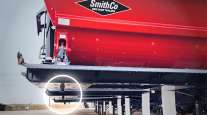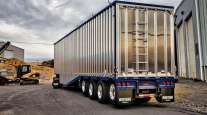Senior Reporter
Trailer Orders Lowest for Any February Since 2009

[Stay on top of transportation news: Get TTNews in your inbox.]
U.S. trailer orders in February weakened to land below 13,000 as the coronavirus threatened to erode demand further, ACT Research reported.
Net orders were 12,743 and the lowest for any February since the 5,400 posted in 2009 during the Great Recession, according to ACT.
Orders fell 45% compared with 22,970 a year earlier, when they were contending for slots in an already lengthy backlog of 8.2 months. The industry backlog this February was 4.9 months, the lowest since October.
Even lower orders than February’s appear to lie ahead. Fleets are consumed with dealing with the coronavirus, one trailer maker executive said.

Giesen
“The virus is definitely having a negative impact on orders. We hear from customers every day saying they are going to wait this out to assess needs,” said David Giesen, vice president of sales for Stoughton. “My interpretation is that they are spending so much time adjusting their business to the rapidly changing environment.
“Driver issues, shipper issues, closings, shortages, restrictions — just navigating through the business operation. It is the topic of the day, taking up the bandwidth, and that doesn’t leave much time to focus on new equipment planning.”
There is a silver lining for those willing to act, he added.
“It has definitely become a buyers’ market,” Giesen said.
“I do not think any fleets will be placing big orders unless aggressive pricing makes it a good move,” said Darry Stuart, principal at DWS Fleet Management, a limited-time-executive transportation and fleet management business.
Another reckoning for future demand is the chance of a recession for the first time in 11 years, which President Donald Trump recently said “may happen.” Some economists are predicting gross domestic product is likely to slip into negative territory in the first and second quarters — two consecutive quarters of GDP decline is the definition of a recession.
“Quite the opposite from last year, when we could not produce enough [trailers],” Giesen said.
Meanwhile, Stoughton created a task force to address this evolving situation. Steps already in place include stopping nonessential visits and meetings, deep cleaning in common areas, no-touch policies that respect personal space, any sick employee is instructed to stay home and frequent communication.
In related news, on March 19, the Department of Labor reported during the week ending March 14, there was a 70,000 increase in seasonally adjusted initial unemployment insurance weekly claims to 281,000 compared with the unrevised level of 211,000 a week earlier.
DOL issued a statement that noted the increase was “clearly attributable to impacts from the COVID-19 virus. A number of states specifically cited COVID-19-related layoffs, while many states reported increased layoffs in service-related industries broadly, and in the accommodation and food services industries specifically, as well as in the transportation and warehousing industry, whether COVID-19 was identified directly or not.”

Ake
Don Ake, vice president of commercial vehicles for FTR, said, “This is about as much uncertainty as can be injected into the trailer market.”
All sectors of the economy are taking hits from the increasing number of business closures and consumers staying home, which “means it impacts all segments of trailers,” he said.
“Fleets get nervous under these conditions and cancel more orders, and that could be the situation in March,” Ake said.
Trailer order cancellations in February were about 2,050, said Frank Maly, director, commercial vehicle analysis for ACT.
“The caution flag is up, and it’s getting an awful lot of attention,” he said.
At the same time, the industry has been on a downward trend as far as the backlog is concerned, and in general, with build rates, too, Maly said. So he was somewhat surprised that February production actually popped compared with January. “Not significantly in total, but the daily rate popped up by about 150 units from what we had in January,” Maly said.

Maly
That means trailer makers still are building more than the orders are calling for, adding to high inventory levels, he said.
“We hear the stories; we don’t get hard numbers at the dealer level, but we certainly hear that that part of the channel is full, too,” Maly said.
In these conditions, he said, production will have to slow down.
“You get to a point where those can become tough decisions because it is a step function. It is generally not a smooth process, with decisions involving fewer shifts or fewer days in the production schedule, he said.
Then it moves past rate adjustments, to staffing issues, Maly added. “The next two or three months, from the orders standpoint, are going to be very tough for all concerned.”
Hyundai Translead “is working to balance the ebb and flow of orders with production capacity. This is an ongoing effort in light of the current market,” said Sean Kenney, senior vice president of direct sales at Hyundai, who is set to become chief sales officer March 24.
Other trailer makers did not respond to requests for comments.
Want more news? Listen to today's daily briefing:




